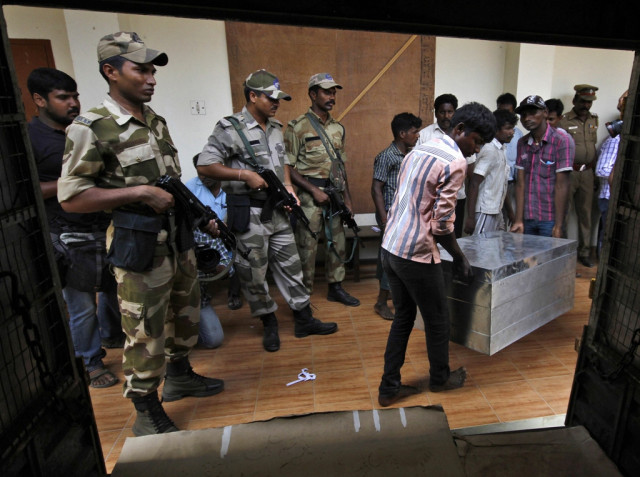Team to trek miles through jungle to reach lone Indian voter
900 million Indians are eligible to cast a ballot over nearly six weeks of voting starting from April 11

Workers carry electronic voting machines (EVM) in a trunk as Indian security personnel stand guard at an election material distribution centre ahead of the sixth phase of the general election in the southern Indian city of Chennai. PHOTO: REUTERS/FILE
The huge undertaking through jungles and over hills involving polling officials, porters and police underscores the logistical challenges confronting India as it prepares to hold the world's largest election.
From the Himalayas to the deserts and lush tropics, 900 million Indians are eligible to cast a ballot over nearly six weeks of voting starting from April 11.
One is Sokela Tayang, 39, the sole registered voter in Malogam -- a tiny hamlet in the isolated and contested northeastern state of Arunachal Pradesh along the border with China.
Dagbom Riba, a local election officer, said a team 15 to 18 strong would have to proceed on foot for six kilometres carrying a ballot box and other voting material through tough terrain to reach Malogam.
Bollywood filmmaker to launch Modi movie around India elections
Once in the village in Anjaw district, rules dictate they must keep the voting booth open all day -- even though just Tayang will be exercising her franchise.
"Even if she casts her vote in the morning, we have to remain open until 5pm in keeping with the election commission guidelines," Riba said. "We are committed to reach out to every single voter so no challenge is big for us."
The Press Trust of India news agency reported that the tiny outpost had two voters in 2014, the other being Tayang's husband. But he had enrolled in another electorate this time around, leaving just Tayang on the registry, PTI said.
Arunachal Pradesh has several polling stations with just a handful of voters. Eight voting booths will have fewer than 10 people turn up, the election commission says.
In past elections, these units have been strapped to camels in Rajasthan and taken to desert tribes. In the north, yaks and mules have been recruited and elephants in India's tropical south.
Election rules stipulate that no voter should have to travel more than two kilometres to cast their ballot.



















COMMENTS
Comments are moderated and generally will be posted if they are on-topic and not abusive.
For more information, please see our Comments FAQ